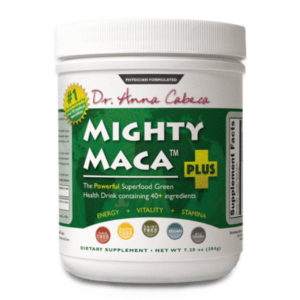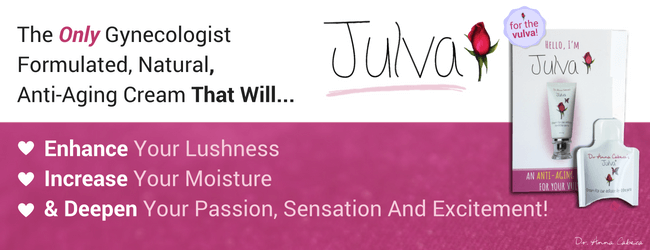Vaginal Dryness, Painful Sex, and Low Libido? There Are Natural Solutions

I recently attended a conference on women’s hormone health and enjoyed a speaker who talked about a little-understood hormone in our bodies called DHEA.
He was talking about all of the emerging research that was showing it to be a wonderful – and completely natural – ingredient for improving a number of common symptoms we women face “down there”--including vaginal dryness, irritation, pain and discomfort, and diminished libido.
He told the audience that one prescription drug containing DHEA had already been approved by the FDA, a vaginally inserted suppository called Intrarosa, approved to treat women experiencing pain during intercourse..
While listening to the speaker I realized that I personally knew a DHEA medical expert, the holistic OB/GYN Dr. Anna Cabeca!
(And since that conference I have also been happily using a product that Dr. Anna researched and developed that contains DHEA along with other natural ingredients, to improve women’s sexual experience and female organ health.)
You know me! Anything clean and natural--that solves a problem without chemical drugs--usually gets my “thumbs up.” And anything that helps with a woman’s quality of life – and her ability to be blissfully intimate with her partner – is definitely something I want to share with all of you.
So I emailed Dr. Anna and asked her to talk to you all about DHEA and how it can be beneficial – and safe - relating to issues of vaginal dryness, diminished libido and painful sex.
Dr. Anna is an Emory University trained gynecologist and obstetrician, a menopause and sexual health expert, and an international speaker and educator.

In this post, Dr. Cabeca talks about how our sexual hormones decline as we age, and how that causes vaginal dryness and other miserable symptoms. (Hot flash lately?)
I especially wanted to hear more from her about DHEA, which she previously prescribed to her patients for over two decades (now available in a natural, topical, prescription-free form).
By Dr. Anna Cabeca
As a gynecologist I have worked with thousands of women over the years, helping them with a wide range of issues including PMS, infertility, menopause and sexual health concerns. I have performed hundreds of surgeries relating to incontinence (involuntary urine leakage) and, shall I say, “wear and tear” on women’s delicate lady parts, either due to pregnancy or other pelvic health difficulties.
While these issues span different age groups, a woman’s underlying hormone health is always the primary influence on how she will experience these female “rites of passage” over the course of her life. And hormone decline is also at the root of most vaginal dryness, pain and libido concerns.
Optimal hormone levels peak in your 20’s! (it’s true!)
As early as in a woman’s 20’s, one key hormone associated with sexual function, DHEA (dehydroepiandrosterone), is already beginning its natural decline. DHEA is an androgenic hormone, as is testosterone; and the decline in androgens is particularly associated with diminishing libido and vaginal dryness, among other symptoms.
Such important functions, yet many women have never heard of androgens or DHEA. Instead our declining or fluctuating estrogen levels seem to traditionally get most of the attention from us, the media and our doctors.
But both are important to how well our “lady parts” age and serve us! Our bodies have estrogen and androgen receptors in our vagina, vulva, clitoris, uterus and urethra bladder, as well as in the musculature around our pelvic floor…so all of these areas can be negatively affected by natural hormone decline.
Symptoms usually worsen over time
As women’s other main sexual hormones (estrogen, testosterone, progesterone) decline during our 30’s and 40’s, this starts to affect the muscles and tissues around the pelvic area, vagina, uterus, rectum and bladder.
Along with irregularities with menstrual cycles, breakthrough bleeding and infertility issues, women may start to experience a variety of symptoms referred to as vaginal atrophy, or thinning of the vaginal walls and muscles, including:
- Decreases in natural lubrication
- A loss of elasticity of the vagina and thinning of the skin
- An increase in vaginal pH and decrease in healthy vaginal flora
- Things may start to just “hurt” down there, especially during or after sex
- Involuntary urine leakage may start to occur (peeing while coughing, laughing, etc.)
Post pregnancy: If you’ve had a pregnancy, you’ve already put some wear and tear on your pelvic muscles. Postpartum and/or breastfeeding can cause vaginal dryness, as well.
While hot flashes actually do usually end up going away, vaginal atrophy symptoms typically do not, and they generally worsen over time. Everyday life can further impact this symptom escalation.
Everyday life further affects our sexual health!
I always say that much of our health is really under our control. Making better lifestyle decisions is really important and can keep our hormones humming along longer-term.
And this is true relating to symptoms of vaginal atrophy as well. Making better lifestyle decisions can improve your sexual hormone health, gut health (which in turn influences your vaginal microbiome, believe it or not!), and can keep your lady parts healthy as well!
Chronic stress is a real turn-off! Turns out all that stress in our life literally shuts us down, creating havoc with our natural hormone cycle and libido. Chronic stress results in too much of our stress hormone, cortisol, being pumped through our system and eventually our adrenal glands shut down reproductive systems and other responses. (You don’t feel like being frisky when your body is shutting down!)
Reduce some of that stress, ladies!
Toxins surround us! Along with stress, there are a number of everyday exposures that can impact a woman’s hormone balance, resulting in worsening symptoms in and around the vagina and pelvic musculature.
Parabens and other hormone disruptors found in personal care products (even your skincare!) surround you, as do many toxins in the environment. Check labels (use the EWG.org database to research your favorite products).
There can even be toxins in sexual lubricants, so please do read those labels before slathering potentially drying or toxic ingredients on your sensitive feminine parts.
Other underlying health conditions are additional risk factors for problems with our lady parts. Diabetes, pre-diabetes and obesity have been shown to increase a woman’s risk for incontinence in particular.
A decreased sex drive as well as vaginal dryness can also be seen as a side-effect of many prescription medications! Certainly antibiotics can also impact vaginal pH and increase the risks for infections there as well. Always ask your doctor about potential side effects!
Poor lifestyle decisions and too many vices can also impact your sexual hormones and resultant symptoms. I recommend a green™ diet. Remove the white processed foods, gluten and sugar, and excessive animal products from your diet--and also the vices (alcohol, smoking, etc.).
How to find your moisture and your happy place again!
Along with cleaning up these lifestyle considerations there are two other things every woman should consider doing: (a) Kegel exercises, and (b) using truly natural lubricants to address lingering vaginal dryness.
Use natural lubricants - these do not contain additional chemicals that can be seen in many commercial lubricants. They can help with discomfort during intercourse, although they do not provide long-term relief or tissue repair. Some favorites are Ayurvedic ghee and organic coconut oil.
Kegel your way to greater pelvic health (stronger muscles = greater pleasure) - Using Kegels to exercise your pelvic floor muscles is key for the majority of women, but most women don’t routinely do them (and even some that do unfortunately don’t do them correctly!). Check out how to do the perfect Kegel here.
If you have that involuntary leak of pee (you know, that “oops!”) when you laugh or cough, please don’t just buy a more absorbent panty liner or pad! This is a serious warning that your pelvic musculature is already weakening.
You need to address this...because if you don’t use it, you’ll lose it! Along with Kegel exercises, you might also need additional support. Read below about how research is showing that DHEA improves the deeper musculature of the vagina.
Should you consider hormone replacement therapies?
There are basically two hormone replacement therapies most women – and their doctors – routinely reach for to address vaginal symptoms caused by hormone decline.
Estrogen hormone replacement therapy (HRT – oral therapy): This prescription treatment is viewed as systemic (meaning the estrogen circulates throughout the bloodstream in the body). Side-effects should be cautiously evaluated, especially for women having breast cancer concerns.
Note that while HRT has been considered helpful for hot flashes, it hasn’t been found to significantly resolve vaginal dryness issues. 40 percent of women receiving HRT have persistent vaginal symptoms. There are some studies that have also concluded that HRT may be associated with worsening urinary incontinence.
Estrogen therapy (locally applied in vagina) may be a better solution to address vaginal moisture and irritation issues. This therapy is also prescription, and can be vaginal tablets, creams or rings. It is not systemic, however, and local, topical application minimizes estrogen increases in blood levels.
Note that this therapy has not been found to improve libido, and further research is needed to validate whether it affects the muscular layer of the vagina (in other words, whether it helps with urinary leaking and pelvic prolapse). Like HRT, it should be thoughtfully evaluated for women who have had breast cancer.
While estrogen has been the primary therapy used by many doctors, I used an alternate therapy – as did many of my holistic peers – for over two decades. I prescribed androgen therapy, consisting of DHEA, testosterone and other natural hormones – with impressive results!
In many cases, when preparing to do surgery relating to pelvic prolapse, I prescribed these treatments to improve the health and integrity of the vaginal wall--only to find that after the treatment, the surgery was no longer needed! And that was two decades ago!
Today, the research is further validating DHEA as a viable and healthy solution to address many symptoms related to vaginal atrophy: vaginal dryness, irritation, discomfort and pain, and low libido.
Additionally, research has shown it can improve the musculature of the deeper layers of the vagina (decreasing symptoms of urinary leakage and pelvic prolapse). DHEA is naturally secreted by the adrenal gland and ovary and is a very protective hormone, with research also indicating it is beneficial for brain health, bone health and breast health, too.
It was exciting (but not surprising) to see the first FDA approved DHEA suppository for women come out on the market recently. This will help so many women. It is, however, only approved to address pain during intercourse, and does still require a prescription.
As with all synthetic drugs, the substance has been molecularly altered from what your body produces naturally, and generally this results in some unwanted, negative side effects. Why wouldn’t we try a natural version, as our first effort?
An anti-aging all natural feminine cream
Years ago, while regularly customizing vaginal hormones for my patients I decided that I needed to provide a natural topical option that would be safe, easy to use and really work even better.
Three years of research, along with my extensive clinical work and experience with my natural skin care line, led me to combine DHEA with other key quality natural ingredients having been shown to be beneficial to skin and its underlying tissues.
Those ingredients include Alpine Rose Stem Cells (shown to increase skin cell replenishment and protect against age-related oxidative stress), Vitamin E Tocopherol, coconut oil (a safe and natural lubricant) and emu oil (promotes deep tissue absorption and helps improve thinning skin).
I wanted this topical solution to help:
- Healing of vaginal dryness
- Increase lubrication and healthy glandular function
- Improve sexual function, satisfaction and pleasure
- Improve the symptoms of incontinence
- Not require a prescription!
- And yes… be tasteless and smell good!
And that’s how Julva, my feminine restorative cream for the vulva was born! And now thousands of women – including Robyn – are fans! After I sent Robyn a free sample, she ordered two more tubes of this amazing female health product and told us she loved it so much, she wanted to tell her audience about it.
You could be a fan, too!
Let me know how you like it.
If you are like Robyn, I know it will help you gain a high-vibe feeling of love, intimacy and flow!
Posted in: Health Concerns, Holistic Care, Lifestyle, Mind/Body Connection, Natural Remedies, Relationships, Tools & Products















